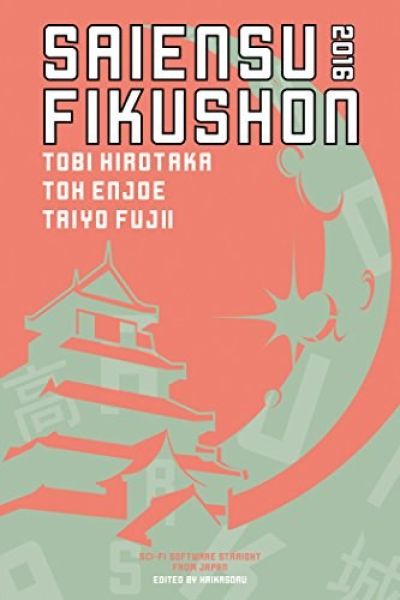Smiled With The Morning Sun
Saiensu Fikushon 2016
By Nick Mamatas & Masumi Washington

6 Dec, 2017
Nick Mamatas and Masumi Washington’s Saiensu Fikushon 2016 is a science fiction anthology that collects three short pieces by TOBI Hirotaka, Toh Enjoe, and Taiyo Fujii respectively.
Introduction by Nick Mamatas and Masumi Washington
A short (to the point of terseness) introduction.
Comments
Given that this anthology is 139 pages, the introduction’s brevity is its strength.
This was intended as the first of a Saiensu Fikushon series.
“Overdrive” by Toh Enjoe (translated by Terry Gallagher)
A conversation between two coworkers produces a transcendent cognitive breakthough.
Comments
This rather New-Wave‑y story didn’t really work for me, probably because I didn’t buy into the author’s ideas about the speed of thought. Thought is a process of the decaying meat-cages in which we’re all inextricably embedded. The speed of thought depends on hardware, and personal optimization. I cannot see thought as anything other than a meat-based process.
“Sea Fingers” by TOBI Hirotaka (translated by Jim Hubbert)
Surrounded by a vast sea of … something... the island of Awazu is one of humanity’s last redoubts. It is sole refuge of the handful of people who haven’t been reduced to compressed data by the something something Sea.
What the Sea steals it sometimes returns. Awazu depends on the treasures it snags back from the Sea. Shogo was no treasure and nobody questioned too closely how it was that he fell into the Sea. Now Shogo is back. He is unaware that he has been transformed and he is determined to take back his wife Shizuko.
A bold plan, given that it was Shizuko who cast Shogo into the Sea the first time…
Comments
Nobody on the island knows where the Sea came from. Hirotaka is too canny to waste time on details that don’t matter to Shizuko’s story, but I assume it was some techbro’s brilliant idea gone horribly right.
This story worked for me when the previous story did not. I suspect that this was because it concerned the people affected by an essentially inexplicable event, rather than being about the event itself. A literal sea of compressed data is probably as nonsensical as the speed of thought, but its plausibility is not the focus of the story. Shizuko is.
A Fair War by Taiyo Fujii (translated by Nathan A. Collins)
An innocent question about an old, half-forgotten mobile phone game provides retired soldier Gongzheng Zhao with the uncomfortable revelation that as a teen he and others like him were manipulated into killing tens of thousands of suspected terrorists and hapless collaterals. Rather than bringing an end to terrorism, the Zhen-pan-da! Initiative only provoked a grander cycle of violence.
But there’s no social problem that properly applied technology cannot solve. Even as he finds himself in the cross-hairs of a terrorist organization, Zhao is drafted into a demonstration of the ORGAN system, an innovative new approach that may transform the face of asymmetric warfare.
Comments
How odd to encounter a story in which the US is in some ways the voice of rationality.…
This is the cousin of stories like Sheffield’s “Fixed Price War” — don’t look at me like that! A forty-year-old story that was only collected in a handful of anthologies and collections, none more recent than the Reagan era, is no sense obscure! — a story in which spiralling violence is interrupted by cognitive and technological judo. An interesting notion, but perhaps impractical, relying as it does on a rare form of rational self-interest (which may not be as fundamental to human behaviour as old-fashioned economists believed).
General comments
Overall, perhaps a little short — but since I found two out of three of the stories diverting, I am going to call this a win.
Saiensu Fikushon 2016 is available here (Amazon) and here (Chapters-Indigo).
